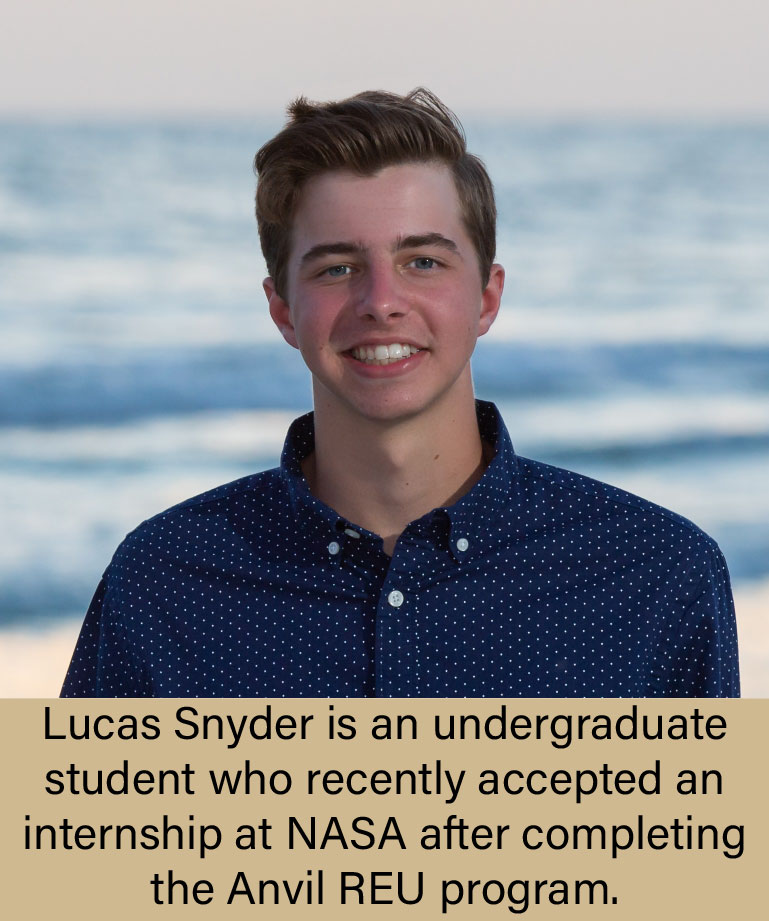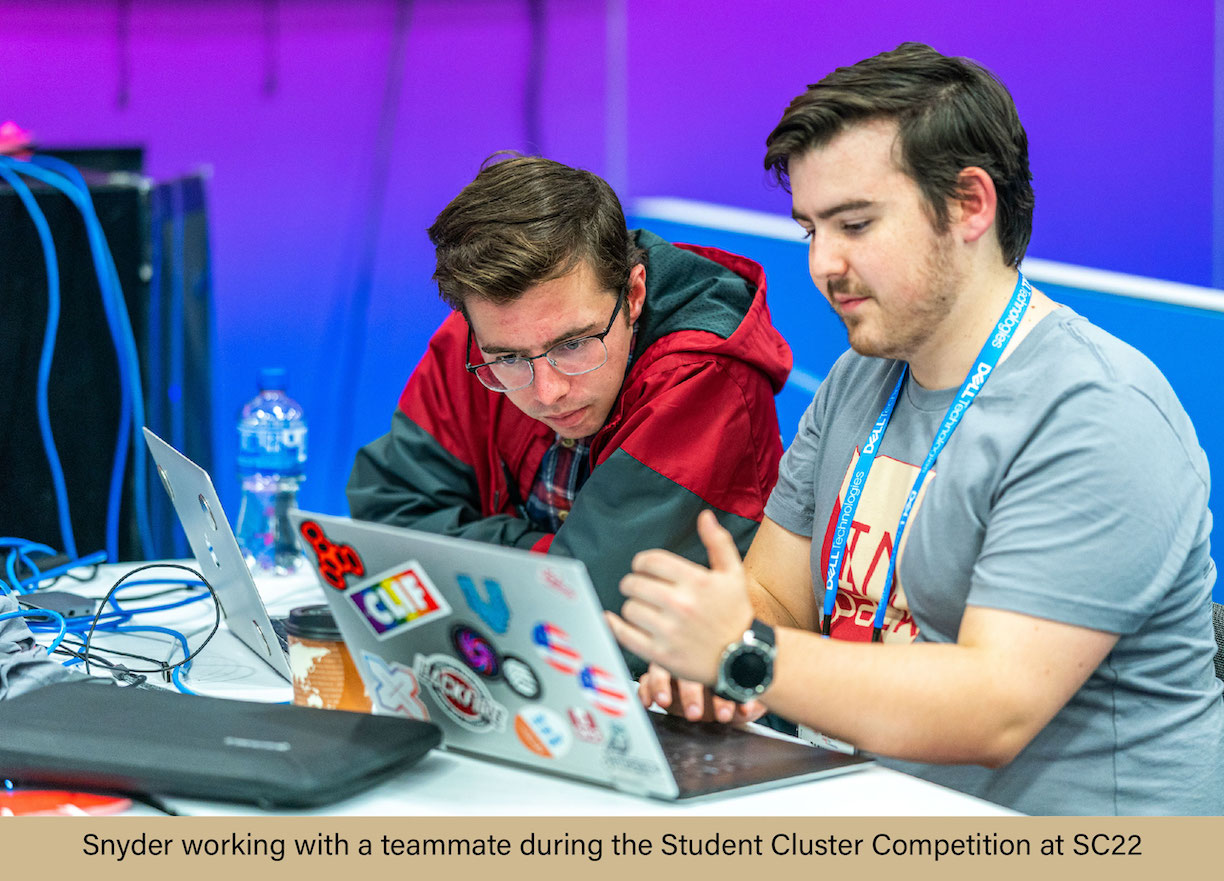Anvil REU Program helps student achieve NASA internship
The Anvil summer Research Experience for Undergraduates (REU) program has once again proven invaluable for the students who participate in the hands-on learning experience.
Lucas Snyder is an undergraduate student  at Indiana University who studies Intelligent Systems Engineering, with his specialty being in Bioengineering. Snyder recently accepted an offer to work as a High-Performance Computing (HPC) intern at the NASA Center for Climate Simulation (NCCS), a department that focuses on weather and climate prediction to enhance NASA’s capabilities in Earth Science. The NCCS houses and maintains multiple supercomputing clusters, providing HPC resources for NASA-sponsored scientists and engineers. It will be these clusters that Snyder will work on during his upcoming internship, which will take place from June to August at the Goddard Space Flight Center, located just outside of Washington, D.C.
at Indiana University who studies Intelligent Systems Engineering, with his specialty being in Bioengineering. Snyder recently accepted an offer to work as a High-Performance Computing (HPC) intern at the NASA Center for Climate Simulation (NCCS), a department that focuses on weather and climate prediction to enhance NASA’s capabilities in Earth Science. The NCCS houses and maintains multiple supercomputing clusters, providing HPC resources for NASA-sponsored scientists and engineers. It will be these clusters that Snyder will work on during his upcoming internship, which will take place from June to August at the Goddard Space Flight Center, located just outside of Washington, D.C.
Snyder attributes his achievement to the knowledge he gained during the Anvil REU program and his experience in the Student Cluster Competition (SCC) at the 2022 SuperComputing Conference (SC22). When relaying this great news to his Anvil REU mentor, Erik Gough, a Lead Computational Scientist at the Rosen Center for Advanced Computing (RCAC), Snyder had this to say:
“Working at NASA has been a dream of mine for years, and I wanted to thank you for the huge role you played in making that a reality for me. Everything I learned on the job at RCAC and during my time with the SCC team has meant so much to me! I can also tell you with absolute certainty that I would not have this opportunity if you'd not taken a chance on me last summer and hadn’t been such an awesome mentor.”
Snyder was a first-time HPC user when he started the Anvil REU program in May of 2022. During the 12-week program, Snyder worked on multiple data analytics projects, including benchmarking and completing scaling and performance studies for the Anvil cluster. He also worked on XDmoD integration and creating a custom Auto-Protect kernel for measurements.
“I can’t even begin to break down everything I learned,” says Snyder. “I was a complete novice to HPC and had never touched a large-scale system like Anvil before. Every day was a new experience for me. I was learning every day and I think that is a direct contributor to me being here now.”
Outside of gaining direct HPC expertise, Snyder also learned a number of “soft skills”—things like how to create a presentation and present to a group of colleagues, or how to organize your findings and develop graphs that people can understand. Snyder noted that these soft skills would be invaluable in the workplace as he moves forward in his career. He also noted that aside from Gough, three other members of the RCAC team—Zachary Weidner, Christopher Phillips, and Elizabett Hillery—were tremendously helpful to him during his time in the program.
After an entire summer of hands-on HPC experience with the Anvil REU program, Snyder joined the joint Purdue-IU Student Cluster Competition team. The team competed at SC22 in the fall, an opportunity that allowed Snyder to not only grow his knowledge base, but also meet the director of the NCCS and learn about the summer internship.

On the last day of the cluster competition, after 72 hours of nearly non-stop work, the team finally completed all of the required tasks. Snyder was then invited to join some friends at an after-hours event, where he was told that they were “going to meet up with some people from NASA.” One of those people was Laura Carriere, the lead of the NASA Center for Climate Simulation.
“I met Laura at this event, and we just started talking. She asked me about my experience, then said, ‘Well, you know, we have summer internships. You should send in an application when it opens up, and we will definitely consider you.’ And I did exactly that. I submitted my application in January, and they got back to me a few months later with an opportunity to interview. The interview went really well, and before I knew it, I had received the offer.”
Within one year, Snyder went from having no HPC experience to obtaining a highly coveted HPC internship at NASA. And it’s clear that Snyder has been bitten by the HPC bug. He had a blast during the Anvil REU program and the Student Cluster Competition, and hopes to compete again at SCC in the future. And even though his background is in biology and bioengineering, Snyder fully intends to continue pursuing HPC as part of his career path.
“I've definitely fallen in love with the HPC stuff, and I will find a way to integrate that into my career.”
The Anvil team and everyone at RCAC is excited for Snyder and wish him the best of luck during his internship at NASA this summer. And to the upcoming Anvil REU students, Snyder had some advice:
“You know, if I could tell them one thing, it would just be to absorb as much as you can. There's so much learning happening, and everyone's going to give you advice, and you should take it. Those people at RCAC are really, really smart, so listen to what they have to say.”
To learn more about the upcoming 2023 summer Anvil REU program, please visit our Research Experience for Undergraduates webpage.
For more information regarding HPC and how it can help you, please visit our “Why HPC?” page.
Anvil is Purdue University’s most powerful supercomputer, providing researchers from diverse backgrounds with advanced computing capabilities. Built through a $10 million system acquisition grant from the National Science Foundation (NSF), Anvil supports scientific discovery by providing resources through the NSF’s Advanced Cyberinfrastructure Coordination Ecosystem: Services & Support (ACCESS), a program that serves tens of thousands of researchers across the United States. Researchers may request access to Anvil via the ACCESS allocations process. More information about Anvil is available on Purdue’s Anvil website. Anyone with questions should contact anvil@purdue.edu. Anvil is funded under NSF award No. 2005632.
Written by: Jonathan Poole, poole43@purdue.edu
